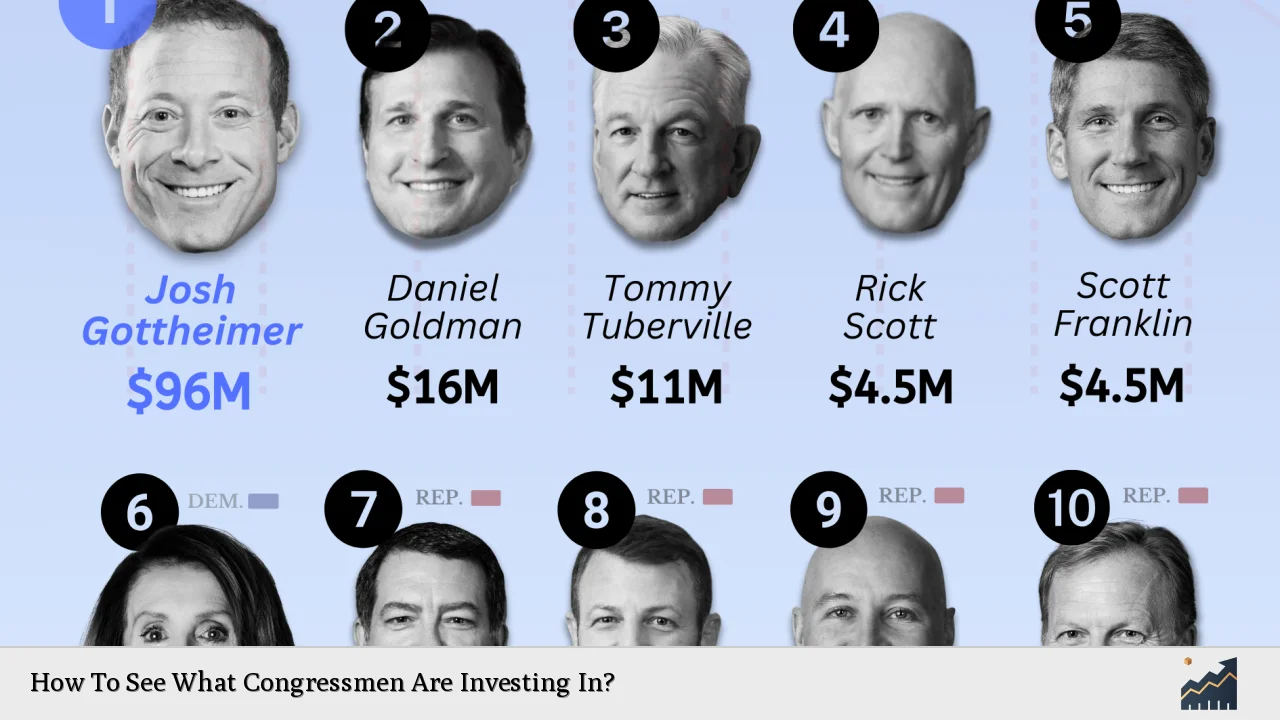Understanding the investment activities of Congress members is crucial for transparency and accountability in government. With lawmakers often privy to sensitive information, their financial dealings can influence market trends and public policy. This guide outlines how to access and interpret the financial disclosures of Congress members, enabling you to monitor their investments effectively.
| Method | Description |
|---|---|
| Public Disclosure Reports | Official documents filed by Congress members detailing their financial activities. |
Understanding Congressional Financial Disclosures
Members of Congress are required to disclose their financial activities under the Ethics in Government Act. This includes reporting any outside income, assets, and stock trades. The purpose of these disclosures is to prevent conflicts of interest and ensure that lawmakers act in the public’s best interest.
The STOCK Act, enacted in 2012, mandates that Congress members report their stock trades within 45 days of the transaction. This legislation aims to curb insider trading by increasing transparency around the financial dealings of lawmakers. It is essential for citizens to be able to track these transactions, as they can provide insights into potential conflicts of interest or unethical behavior.
Congressional financial disclosures are available through various platforms, including official government websites and third-party tracking services. These resources compile data from the required reports, making it easier for the public to access and analyze the information.
Where to Find Congressional Financial Disclosures
There are several reliable sources where you can find detailed information about what Congress members are investing in:
- House and Senate Financial Disclosure Websites: Each chamber of Congress maintains a website where you can access financial disclosure reports. The House of Representatives has its own site, while the Senate provides a separate portal for its members.
- Capitol Trades: This platform tracks stock trades made by Congress members, providing insights into their trading activity over time. Users can view recent trades, analyze trading volume, and see which stocks are being bought or sold by lawmakers.
- OpenSecrets: This website offers a comprehensive overview of politicians’ personal finances, including income sources and investment portfolios. It is a valuable resource for understanding the financial landscape of Congress.
- Quiver Quantitative: This tool allows users to track stock trading activity by members of Congress. It provides insights into recent trades and enables searches by politician or stock.
How to Analyze Congressional Investments
Once you have accessed the financial disclosures, it is crucial to analyze the data effectively. Here are some key steps:
- Identify Major Trades: Look for significant buy or sell transactions that may indicate a change in investment strategy or insider knowledge.
- Monitor Trading Patterns: Track how often specific lawmakers trade stocks, especially in industries related to their legislative work. Frequent trading may raise ethical concerns.
- Compare Performance: Assess how stocks traded by Congress members perform over time compared to market averages. This can provide insights into whether their trades are based on informed decisions or speculative behavior.
- Watch for Legislative Connections: Pay attention to any correlations between a lawmaker’s investments and upcoming legislation they may influence. Such connections could point to potential conflicts of interest.
Tools for Monitoring Congressional Stock Trades
To streamline your monitoring efforts, consider using specialized tools designed for tracking congressional stock trades:
- Finbold Signals: This service sends real-time alerts on stock transactions made by Congress members via Telegram, Email, or Discord, ensuring you stay updated on their trading activities.
- Smart Insider: This platform offers a database of U.S. politician stock trades, allowing users to search individual members or stocks easily.
- Capitol Trades: As mentioned earlier, this site provides detailed insights into trading activity on Capitol Hill, making it easier to follow specific lawmakers’ investments.
Using these tools can enhance your ability to keep tabs on congressional investments and make informed decisions based on their trading patterns.
The Importance of Transparency in Congressional Investments
Transparency in congressional investments is vital for maintaining public trust in government institutions. When lawmakers disclose their financial activities, it helps ensure they are not using their positions for personal gain at the expense of constituents.
Moreover, tracking these investments can empower citizens by providing them with information about potential conflicts of interest. By holding elected officials accountable for their financial dealings, voters can better assess whether their representatives act in the public’s best interest.
In recent years, there has been growing concern over the ethical implications of congressional stock trading. Proposals have emerged advocating for stricter regulations or outright bans on such activities among lawmakers. These discussions highlight the need for ongoing scrutiny of congressional investments and the importance of robust disclosure practices.
FAQs About How To See What Congressmen Are Investing In
- What is the STOCK Act?
The STOCK Act requires Congress members to publicly report stock trades within 45 days to prevent insider trading. - How can I track congressional stock trades?
You can use platforms like Capitol Trades and Finbold Signals for real-time updates on trades made by lawmakers. - Are there penalties for not reporting trades?
Yes, lawmakers face fines if they fail to report trades within the mandated timeframe. - What types of investments must be disclosed?
Congress members must disclose stocks, bonds, mutual funds, and other securities exceeding $1,000. - Can I access historical trade data?
Yes, many platforms provide access to historical trade data for analysis.
By utilizing these resources and strategies effectively, you can gain valuable insights into what Congress members are investing in and how it may impact your own investment decisions. Monitoring these activities not only promotes transparency but also fosters accountability among elected officials.

